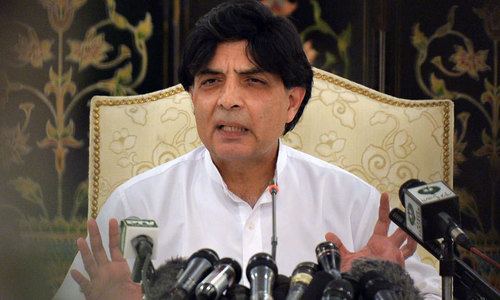
Pan the eye of memory back to not all that many years ago, when in the evening after the Secretariat complex had emptied of its bureaucrat inhabitants, the sprawling area near D Chowk would come alive with families that came to stroll, picnick on the greenbelt and let the children play there. When, not long after this period, the Capital Development Authority installed attractive cluster globe lights, which lit up the area beautifully after dark, the spot became even more popular.
People would park along the edge of the area, and those who needed to rest their aging bones now and then pausing to laze on the grass. Teenage boys would perform stunts on motorbikes, and somewhere there would always be a game of cricket. That all this peaceable activity was happening under the shadow of President House and Parliament House made it even more interesting, and back in those days, during the summer, the area would remain alive with people until well past midnight. That was D Chowk then.
A few years before this period, the road linking D Chowk to Blue Area had officially been designated the Parade Ground when the annual March 23 national day parade was shifted to Islamabad from Rawalpindi’s Race Course.
Rows of brick bleachers were constructed on the vast tract on both sides of the metalled road; landscaping was undertaken, and evergreen trees and seasonal flowerbeds planted. Once a year, the country’s men and women in uniform would participate in the grand parade, a full-on affair with tank and artillery displays, and fly-pasts by the Pakistan Air Force. That, too, was D Chowk once.
But then came the wave after wave of militancy and terrorism. The gap between the state and the citizens grew wider, and the authorities apparently felt disquiet in the public having such easy access to the vital state institutions. During the period when retired Gen Pervez Musharraf served as the head of the armed forces and the president of the country, the Aug 14 parade was moved to a more confined — perhaps more easily defendable — premises; and the D Chowk area was made off-limits for the public.
Even so, sections of the public continued to claim their right over the space. The spot became a favoured end-point to attempts to reach during protest marches and demonstrations. From former prime minister Benazir Bhutto to the Jamaat-i-Islami’s Qazi Hussain Ahmed, and from the PTI’s Imran Khan to PAT’s Tahirul Qadri, many leaders of varying hues have used this location to demonstrate their street power and try to force governments to accept their demands. Hundreds of people and organisations have, over the years, expressed their frustration with the policies/actions of the government of the day right in the implacable face of state authority.
Yet none of these governments tried to take away this right of the people to protest in the proximity of Parliament House and the President House until now. After the recent failures to politically and administratively handle some groups of protesters, the government of Prime Minister Nawaz Sharif has ordered that this place be dismantled. Accordingly D Chowk is currently thronged by dozens of labourers who are taking the Parade Ground apart on the orders of Interior Minister Chaudhry Nisar Ali Khan. The government clearly wants protests to be held far away from its own doorsteps. D Chowk now presents the picture of a ruin, surrounded as it is with policemen and trucks, and hedged with barbed wire and concrete bollards. In the centre of the destruction is a mountain of broken bricks — once the seats constituting the bleachers of the Parade Ground. So far, no plan has been announced for the spot. Meanwhile, the federal government has proposed the Fatima Jinnah Park as an alternative venue for protests. This is situated several kilometres away from the bureaucratic hotspot of the central government district; gatherings here will probably not disturb the rulers. This park currently features swings, jogging tracks, tennis courts and a cricket ground. There is a restaurant and a clubhouse, as well as many other facilities specified for the public. Were crowds of thousands of angry protesters diverted here, as the government suggests, the fate of the park can easily be foreseen.
“This is a pathetic step,” says Mobarik Ahmed Virk, a senior journalist in the capital who has seen both D Chowk and the Fatima Jinnah Park evolving from nothing to the national monuments they are today. “This is no way to deny space to people who want to express anger against the government. Instead of pushing protesters away from government installations, the authorities should take measures to discipline them and educate them on protecting public and private spaces,” says Virk. “The government can allay anger by providing people with what they need to prosper. Building fences, barricades and roadblocks is not going to solve the central problems and will only destroy and deface beautiful spaces such as D Chowk and the Fatima Jinnah Park.”
Published in Dawn, April 12th, 2016














































